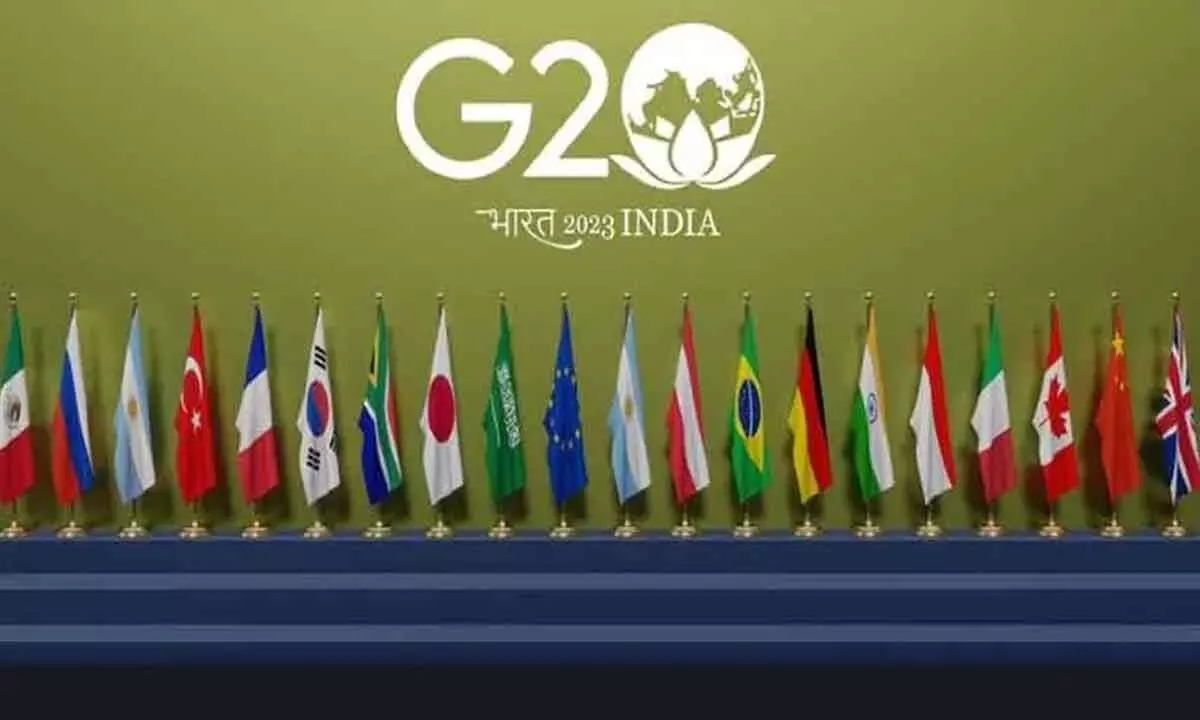G20’s commitment to green and sustainable growth: A milestone for environmental prosperity

The leaders acknowledged India’s Presidency for efforts in developing the compendiums of best practices in water management, mining-affected areas, and forest fire-impacted areas, and for conducting a technical study on ‘Accelerating the transition to a sustainable and resilient blue economy’, and preparing technical documents on significant topics such as Knowledge Exchange on Circular Economy in Steel Sector, Extended Producer Responsibility and Circular Bioeconomy
New Delhi: The two-day G20 policy workshop on the Green and Sustainable Growth Agenda for the Global Economy, held in New Delhi, marked a pivotal moment in environmental progress.
It was organised by NITI Aayog, in collaboration with IDRC and GDN, the workshop brought together over 40 global experts from diverse fields. It served as a side event of the G20 and delved into crucial themes of green growth, energy, climate, technology, and policy, among others.
The gathering generated valuable recommendations for green and sustainable growth, emphasizing a resolute commitment to a greener future.
Concurrently, the 4th and last ECSWG and Ministers meeting was held in Chennai that highlighted significant achievements while acknowledging the urgent challenges that demand global attention.
Indian Prime Minister Narendra Modi’s vision, alongside India’s leadership and initiatives, exemplified dedication to environmental conservation and prosperity.
As the G20 reaffirmed its commitment to climate action and the Paris Agreement, some areas remained unresolved, necessitating focused efforts at the upcoming COP28 talks to drive tangible progress.
A two-day G20 policy workshop on the Green and Sustainable Growth Agenda for the Global Economy was held on July 28-29 in New Delhi. It was organised by NITI Aayog in collaboration with the International Development Research Centre (IDRC), Ottawa, and the Global Development Network (GDN), New Delhi, to discuss the prospects and challenges of green and sustainable growth on a global scale.
The workshop was a side event of G20 that covered various themes related to green growth, energy, climate, technology, policy, employment, multilateralism as well as adjustment, resilience and inclusion in an uncertain world, etc. The two-day policy workshop was attended by more than 40 global experts from diverse fields.
NITI Aayog Vice-Chairman SumanBery emphatically asserted that the goal of achieving a green transition aligns with the larger objective of becoming a developed nation by 2047.
The discussions during this policy workshop have generated several important suggestions and recommendations for green and sustainable growth. Bery observed that NITI Aayog will pursue some of these through various fora. With unwavering dedication, they endeavour to propel the global economy towards a future defined by environmental resilience and prosperity.
The G20 Sherpa Amitabh Kant observed that achieving the Sustainable Development Goals and climate action needs an investment of about five to six trillion dollars. This in turn is likely to throw up business opportunities of about 90 trillion dollars.Referring to Prime Minister Modi’s vision of achieving the Net Zero target by 2070, Kant observed that India will play a key role in green growth and sustainable development. BVR Subrahmanyam, CEO of NITI Aayog, underlined the institution’s commitment to a fundamental role in creating ecosystems that facilitate the adoption of frontier technologies.
At about the same time, the 4th and conclusive Environment and Climate Sustainability Working Group (ECSWG) and Environment and Climate Ministers meeting, took place in Chennai.The meet saw the consensual adoption of an Outcome document, the Chennai High Level Principles for a Sustainable and Resilient Blue/Ocean-based Economy.
It will be submitted to the Leaders for their consideration to be appended to the G20 New Delhi Leader’s Declaration 2023. This milestone underscores a steadfast commitment to nurturing a sustainable and resilient blue economy, resonating profoundly with environmentalists worldwide.
Bhupender Yadav, Union Minister of Environment, Forest and Climate Change presided over the Ministerial meeting and commanded the attendance of 41 Ministers or their deputies from the various nations.
The meeting was animated by proactive engagement from over 225 delegates representing G20 member countries, invitee countries and heads and representatives of 23 International organizations including UNEP, UNFCC, COP28 and UNCCD. Their interventions revolved around critical challenges pertaining to concerns about climate and environment which call for urgent global attention.
Highlighting India’s initiatives being powered by people’s participation, Modi cited the example of Mission AmritSarovar, a unique water conservation initiative under which more than sixty-three thousand water bodies have been created.
The leaders acknowledged India’s Presidency for efforts in developing the compendiums of best practices in water management, mining-affected areas, and forest fire-impacted areas, and for conducting a technical study on ‘Accelerating the transition to a sustainable and resilient blue economy’, and preparing technical documents on significant topics such as Knowledge Exchange on Circular Economy in Steel Sector, Extended Producer Responsibility and Circular Bioeconomy. India has also prepared the Gandhinagar Implementation Roadmap and Gandhinagar Implementation Framework for voluntary adoption by G20 members.
Bhupender Yadav noted with satisfaction that the Environment Climate and Sustainability Working Group had arrived at a high degree of consensus towards addressing the critical pillars of environment and sustainability. The ECSWG’s journey under India’s Presidency concluded with the adoption of the Chair’s Summary and Outcome Documents.Yadav also highlighted the successful Mega Beach Clean Up Event at Juhu in Mumbai, with participation from 20 countries and 37 Indian beaches spanning coastal states and Union Territories. The event aimed to raise awareness and sensitize people in line with the
Indian Ministers’ message of ‘Swachhta’ (cleanliness) and ‘Jan Bhagidari’ (Community participation). He further emphasized the unique concept of ‘Lifestyle for Environment’ (LiFE) and the crucial role of individual actions in combatting marine pollution.The launch of an industry-led Resource Efficiency and Circular Economy Industry Coalition (RECEIC) was another significant intervention under India’s G20 Presidency. The coalition was launched by minister Yadav in the presence of the Commissioner from EU and Ministers from France, Canada, Italy, Denmark, Mauritius and the UAE. The G20 Ministers also called for the G20 Resource Efficiency dialogue to engage with RECEIC and leverage synergies.
India’s G20 Presidency released one outcome document and two Presidency Documents under the theme of Blue Economy. Four Presidency Documents and Compendiums of Best Practices under the theme of Land and Biodiversity and Water resources management were released. There are four more Presidency Documents under the theme of Resource Efficiency and Circular Economy.
G20 countries reaffirmed their resolve to tackle climate change and ambitious action across all pillars of the Paris Agreement. Themes like ecological restoration, marine spatial planning, and circular economy were addressed for the first time in the G20 discussions in detail.
However, the Chennai meet saw some challenges in reaching a consensus on various environmental goals, such as renewable energy, fossil fuel reduction, energy efficiency improvement, and GHG emissions peaking by 2025.
Despite the presence of climate and energy ministers from all G20 nations significant progress on these issues remained elusive. Now, the focus shifts to the upcoming COP28 talks this winter, where tangible strides towards addressing these concerns can be achieved.
The adoption of the Chennai High Level Principles for a Sustainable and Resilient Blue/Ocean-based Economy exemplified a collective determination to nurture a sustainable ocean-centric future.
However, as the G20 reaffirmed its commitment to climate action, challenges still persist, necessitating unwavering attention and action at the forthcoming COP28 talks.
(Writer is an expert on India’s foreign affairs. He is the Principal Investigator of a National Project on India’s Soft Power Diplomacy)
















